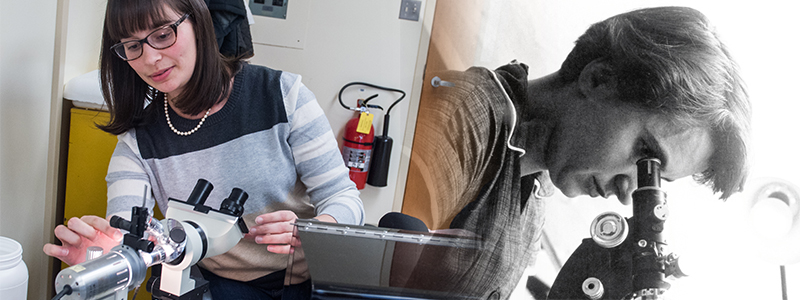Engendered Bias: Female Undergrads Share STEM Experiences

We asked several female University of Chicago undergraduate science students to reflect on Rosalind Franklin and their own experiences in overcoming gender-related obstacles in their fields. Their answers illuminate the challenges women continue to face in STEM fields, and uncover the unconscious biases young women encounter growing up.
Why do you think Rosalind Franklin’s story is especially resonant today?
“Today, we are far more aware of the bias against women in traditionally male fields, and Franklin’s story—that of an extraordinary scientist whose contributions to the structure of DNA were not recognized in the 1962 Nobel Prize awarded to her male colleges—is an archetypical reminder of the barriers we’ve overcome and the ones we still face today,” says Hannah Morin, AB’20, a chemistry and molecular engineering major.
Khloe Pastore, AB’21, studying biology, adds that “While there are a great deal more opportunities today for women in science, a large amount of sexism still exists that makes it seem as if men’s ideas are somehow more important and valid than women with the same basis of knowledge and experience.”
Elizabeth, another biology major, agrees that “Part of that process is not only giving women scientists today the recognition that they deserve, but also emphasizing the role that women had in past discoveries that were glossed over due to their gender. I think that can be really important in inspiring women to pursue science, because they can look up to all of the women who have made meaningful contributions before them.”
Do you identify with Franklin’s struggles? In what ways?
According to Khloe, “I have been refused an opportunity that a man with qualifications equal or lesser than my own was handed without a second thought.” Elizabeth also says that “there is still a cultural norm that men are good at math and science, while women are not. I definitely felt that growing up.”
Hannah has had a similar experience: “On a very basic level I assume Franklin found herself the only woman in a room too and had to constantly combat the idea that women are not good at math or are not technical. Back then, we didn’t have a word for impostor syndrome, but having to constantly combat the idea that the group, not a particular individual, is incompetent is exhausting.”
What does it mean to be a female scientist in 2018? Has that changed in your lifetime?
Hannah tells the story of how, “A few years ago, Nobel Laurette Tim Hunt told a convention of female scientists he was in favor of same-sex labs, because when women are in the lab, ‘You fall in love with them, they fall in love with you and when you criticize them, they cry.’ In the same breath, he declared that he ‘didn’t want to stand in the way of women.’ These clashing ideals are representative of the female experience in science: the field knows we need to support women, but old habits die hard.”
To Khloe, “As a female scientist, you aren’t just representing yourself, you’re representing an entire group of women working in fields that even 50 years ago weren’t readily available to us.”
What can audiences learn from Franklin’s story?
“At 16, she decided she wanted to be a scientist. The year was 1937, and female scientists were almost unheard of. During the three years leading up to her PhD, she published an amazing five papers. Her work on plant viruses was pioneering and before her death she was already giving talks on the topic. Watson caricatured her as incompetent and ill-tempered; we must be careful not to caricature her as the woman passed over for the Nobel. She was much more than that,” argues Hannah.
Finally, Khloe adds, “An important takeaway from Franklin’s story is that while women in science have come a long way since the 1950s, there’s still a lot that needs to be done in order for women to be seen as equals to their male counterparts.”
See these issues explored more in Anna Ziegler’s play about Rosalind Franklin, Photograph 51. Learn more about the play →
Girls in middle and high school are invited to share their interests in STEM fields by completing a brief survey. Responses will be showcased during Photograph 51 in a Court lobby display representing the future of women in STEM. → Share with the STEM girls in your life!